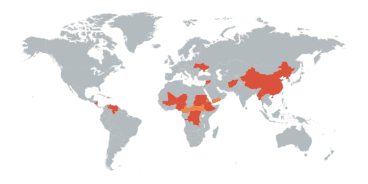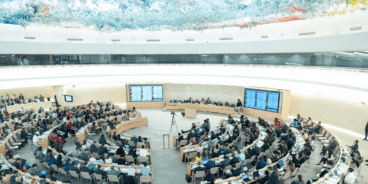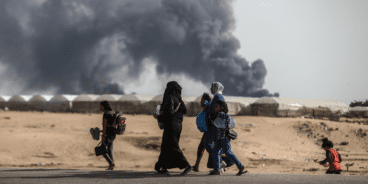
Atrocity Alert No. 152: Sri Lanka, Yemen and Libya
Atrocity Alert is a weekly publication by the Global Centre for the Responsibility to Protect highlighting situations where populations are at risk of, or are enduring, mass atrocity crimes.
Easter Sunday atrocities in Sri Lanka
Last Sunday, 21 April, eight coordinated bomb attacks across Sri Lanka killed at least 359 people and seriously wounded 500 others. The attacks targeted the minority Christian population and occurred during Easter Sunday services when suicide bombers detonated devices inside three crowded churches. Luxury hotels in Colombo frequented by foreign tourists were also targeted.
The government has blamed a local extremist group for the attacks – the National Thowheeth Jama’ath – claiming that the nine Sri Lankan suicide bombers were also working with foreign terrorists. On Tuesday the so-called Islamic State of Iraq and the Levant (ISIL or ISIS) claimed responsibility for the attacks.
Police had reportedly tried to warn security officials of a possible threat to churches ten days before the bombings. Indian intelligence authorities also reportedly alerted their Sri Lankan counterparts. In the aftermath of the attacks the government has imposed a state of emergency, which allows the military to detain and question suspects without a court’s approval. At least 60 individuals have already been arrested. The government has also blocked major social media and messaging services, such as Facebook and WhatsApp, with the justification that they are trying to stop misinformation that could potentially spark religious or ethnic violence.
Sri Lanka is a multi-ethnic, multi-religious society with a recent history of inter-communal violence, including a series of anti-Muslim riots in March 2018. Two people were killed and over 400 buildings, businesses and vehicles were seriously damaged. In recent years there has been an alarming rise in chauvinistic Buddhist nationalism amongst the majority Sinhalese population, with people utilizing social media to incite division. While recent hate speech has largely focused on the Muslim minority, Christians also make up approximately 7 percent of the country’s population.
The Easter Sunday bombings constitute the deadliest terrorist attack in Sri Lanka since the country’s 26-year civil war ended a decade ago. Armed conflict between the government and Tamil separatists, the Liberation Tigers of Tamil Eelaam (LTTE), resulted in the deaths of more than 100,000 civilians, including at least 20,000 Tamil civilians who were killed in 2009 during the final stage of the war. Despite overwhelming evidence of atrocities, there has been no real domestic accountability for war crimes and crimes against humanity committed during the 1983-2009 conflict.
The Easter Sunday attacks should not be used to foment further division or as a pretext for the security forces to implement a wider crackdown on democracy, free speech and human rights. In addition to ensuring justice for the victims and survivors of the attacks, the government must confront the underlying sources of ethnic and religious tension that extremist groups are seeking to exploit and uphold its responsibility to protect all of Sri Lanka’s diverse communities.
Yemen: Airstrikes and cholera intensify despite ‘Stockholm Agreement’
The conflict in Yemen continues to have dire consequences for civilians. On 14 April the World Health Organization reported that nearly 225,000 suspected cases of cholera, including at least 55,000 children under five, have been documented so far this year. UN Under-Secretary-General for Humanitarian Affairs Mark Lowcock noted that current trends could quickly result in “mass morbidity and death,” citing the collapse of Yemen’s water and sanitation systems as one of the major drivers of the outbreak. A 2017-2018 cholera outbreak in Yemen resulted in 1.1 million cases and over 2,300 deaths.
Despite reassurances by all warring parties that they remain committed to implementation of the December 2018 “Stockholm Agreement,” deadlines continue to be missed. While the agreement has reduced armed hostilities in the port city of Hodeidah, fighting has increased elsewhere in the country. On 18 April the Armed Conflict Location and Event Data Project (ACLED) reported that Yemen’s conflict has resulted in 7,600 fatalities so far this year, including 380 civilians who were deliberately targeted.
On 16 April United States President Donald Trump vetoed bipartisan legislation that sought to end United States involvement in the war in Yemen by halting military support for Saudi Arabia. According to ACLED, the Saudi-led international coalition is responsible for the majority of civilian fatalities in Yemen. The Yemen Data Project reported that March 2019 saw the highest number of civilian deaths resulting from Saudi-led coalition airstrikes since November 2018. Since January 2016 at least 70,200 people have been killed in Yemen, including over 7,000 civilians.
All parties to the conflict should continue to work with the UN Special Envoy to Yemen, Martin Griffiths, and uphold the Stockholm Agreement. Both sides should immediately withdraw their troops from Hodeidah and stop obstructing the delivery of vital humanitarian aid, including medical supplies that are essential for the treatment of cholera.
Libyan General attacks civilians and UN-backed government in Tripoli
On 4 April Field Marshal Khalifa Haftar ordered his self-proclaimed Libyan National Army (LNA) to launch an offensive against the UN-backed Government of National Accord based in Libya’s capital, Tripoli. According to the UN Office for the Coordination of Humanitarian Affairs, heavy artillery fire in residential areas has blocked emergency services and aid from reaching vulnerable civilians and has prevented people from fleeing to safety. Attacks on civilians and civilian infrastructure violate International Humanitarian Law (IHL) and may constitute war crimes.
Since the beginning of the LNA offensive over 35,000 civilians have been displaced. The UN Children’s Fund has warned that an estimated 500,000 children in Tripoli are at a “direct risk” as the fighting moves into heavily populated residential areas. The UN High Commissioner for Human Rights, Michelle Bachelet, noted that Libya’s people “have long been caught between numerous warring parties, with some of the most vulnerable suffering some of the gravest violations of their human rights.”
Haftar launched his offensive while UN Secretary-General António Guterres was visiting Libya ahead of a now-postponed national conference regarding long-delayed elections.
Forces loyal to both the LNA and the UN-recognized government have a history of abuses against civilians. In previous military offensives the LNA has carried out indiscriminate attacks on civilian areas and summarily executed captured enemy combatants. Government-allied militias have also been implicated in attacks on civilian areas and have arbitrarily detained and abused thousands of African migrants and asylum seekers in Libya.
Following UN Security Council Resolution 1970 the International Criminal Court may exercise jurisdiction over war crimes and crimes against humanity committed in Libya since February 2011. As fighting for control of Tripoli intensifies, all parties must uphold their obligations under IHL and International Human Rights Law. Those who conduct indiscriminate attacks on civilian areas and commit potential atrocities should be held accountable, regardless of their position or affiliation.
Related Publications


